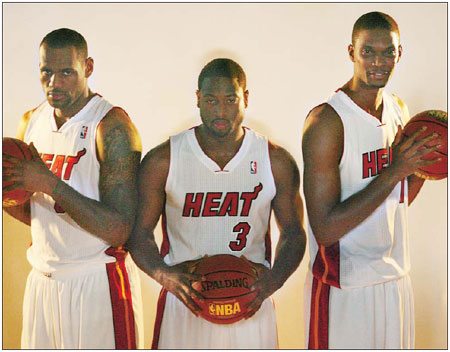Top News
NBA's power shift
By Tym Glaser (China Daily)
Updated: 2010-10-24 08:35
 |
Large Medium Small |
|
(From left to right) LeBron James, Dwyane Wade and Chris Bosh of the Miami Heat pose for photos during media day at the Bank United Center on Sept 27 in Miami, Florida. The teaming of the Big Three will likely change the balance of power between the West Conference and East Conference as the NBA new season is set to start. [Marc Serota / Agence France-Presse] |
The league's star players are starting to flex their collective strength now and, in the case of the Miami Heat, have made a pretender into an instant contender, but is this good for the competition? Tym Glaser asks
The balance of power has shifted in the NBA, and as the 2010-2011 season gets set to tip off on Tuesday, it's hard to work out if that is a good or bad thing.
After at least two years of speculation over whether the game's greatest young talent, LeBron James, would stay in Cleveland or move on to greener pastures, he, in a tacky one-hour special on ESPN, announced he was flying south for the winter to join Olympic pal Dywane Wade at the Miami Heat.
Chris Bosh, another member of the US's 2008 Games' squad - and about the only good thing the Toronto Raptors had going for them over the past few years, wasted no time in joining his pals in South Beach and, voila, the Heat have suddenly gone from first-round playoff fodder to near favorites to win the NBA Championship.
That probable reversal of fortune is great for the folks in Florida, but not necessarily for the league and I don't mean the other 29 teams.
I refer to small and cold market teams and that star players, like the latest Big Three of Wade, James and Bosh, can collude about where they want to team up and virtually hold club owners and general managers to ransom.
NBA Commissioner David Stern told China Daily on his recent visit to these shores that he wasn't concerned about the emergence of another super team in the league.
"They (the Heat) have not played one game yet in the regular season," Stern said.
"It's premature to say it's a super team. We can say Kobe (Bryant), Pau (Gasol) and Lamar (Odom), that's a super team. Kevin (Garnett), Paul (Pierce), Ray (Allen),that's a super team, he said.
"We will see if the Heat will become a super team in the new season.
"In most cases, there's always been a tendency to have a big three or even big four; from Larry Bird, Robert Parish and Kevin McHale to Michael Jordan, Scottie Pippen and Steve Kerr or somebody.
"It's interesting to me. It's too soon to make a judgment (if it's good or bad)," said Stern, who took over as commissioner in 1984 when Boston's Bird-led troika was battling it out with the Lakers' triumvirate of Magic Johnson, Kareem Abdul-Jabbar and James Worthy.
However, those teams were basically put together by general managers through sharp trades and canny draft picks; not by three stars working out where they wanted to play together.
To be fair, it appears the James Gang took less money to play togetherand try to bring another title to south Florida. And, as free agents, it was their right to chose where and with whom to play (can you really blame LeBron for leaving Cleveland for sunny Miami?).
But where does this leave teams in struggling or small markets like Cleveland and Minnesota and Toronto and Detroit and Milwaukee? And let's not forget Denver, which is likely to have to trade star forward Carmelo Anthony, another Beijing 2008er, just to get some value for him before he heads off to free agency at the end of this season.
Melo's likely destination appears to be the big market New York Knicks where he would join all-star Amare Stoudemire, who was also a member of that US squad before pulling out with a knee injury.
This coming NBA season will mark a new phase in the evolution of professional sport with star players potentially able to influence the makeup of teams just as much as GMs and owners - possibly even more.
Let's see how the Miami experiment pans out. As Stern says, at the very least, it will be "interesting".
